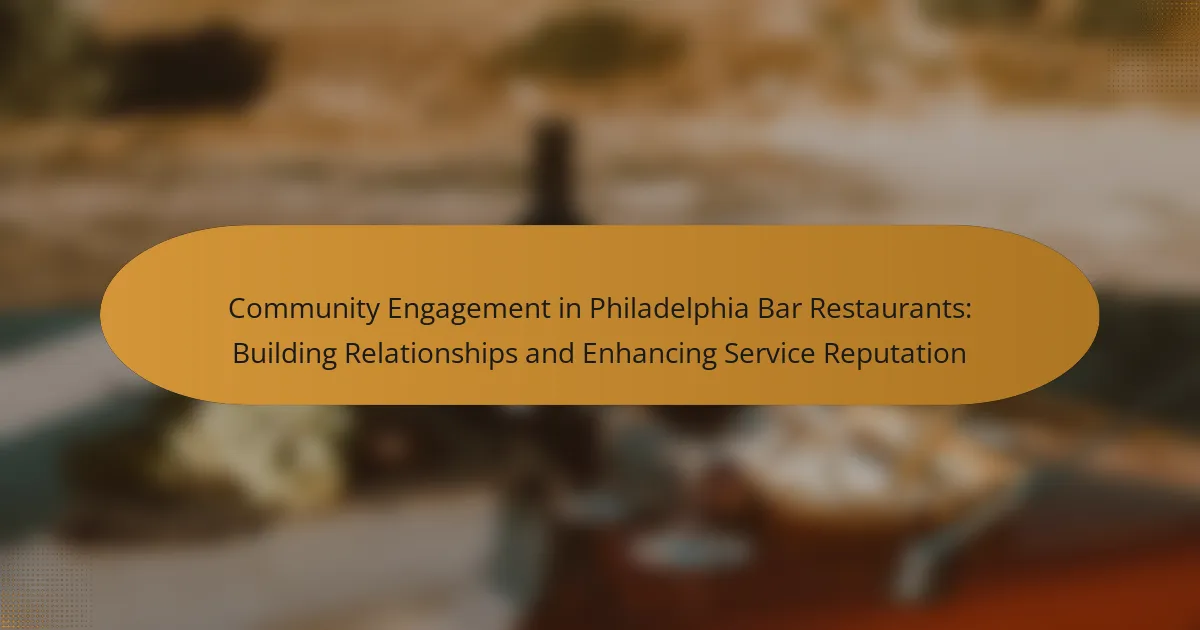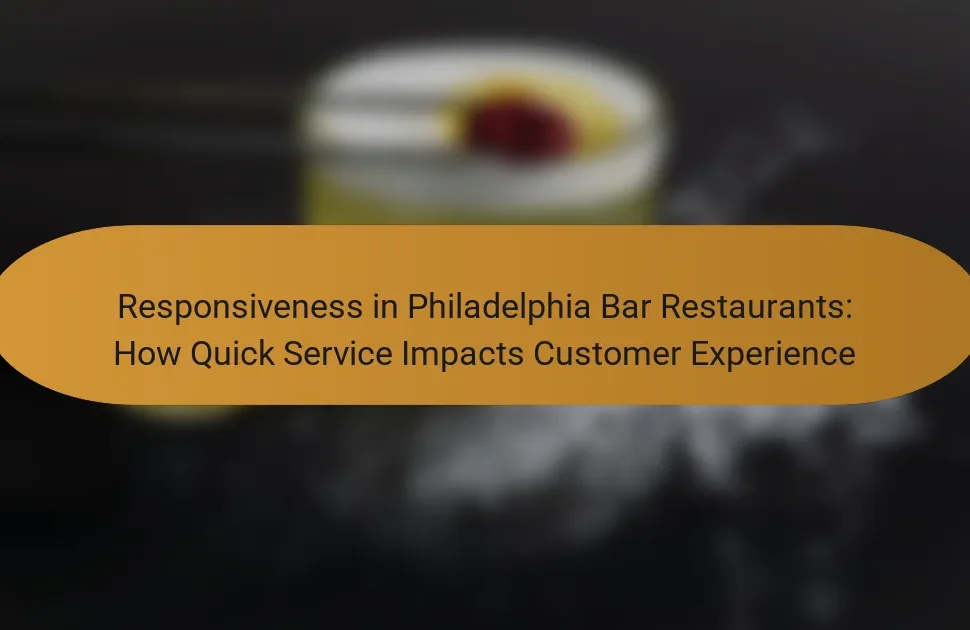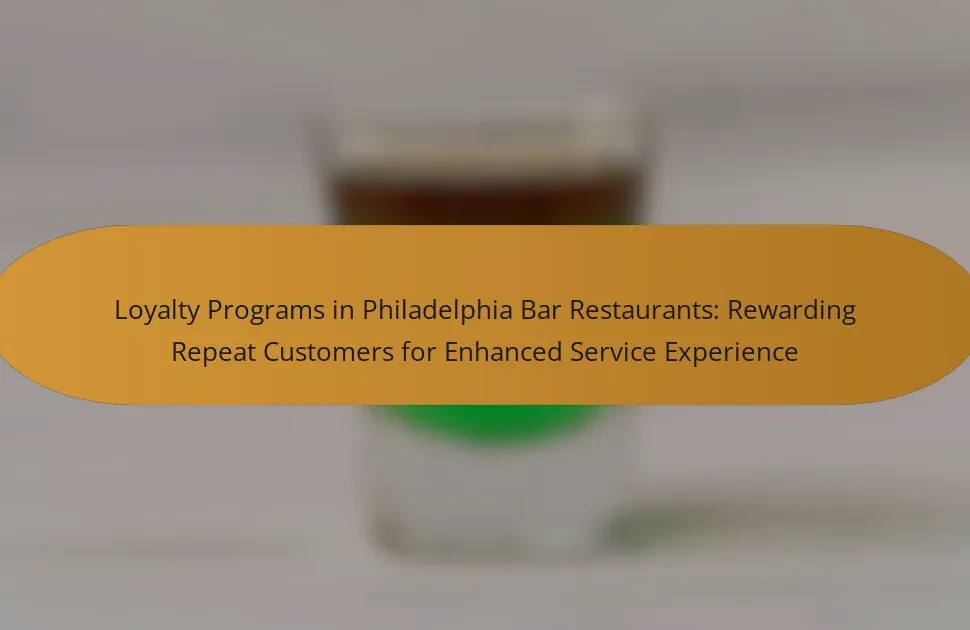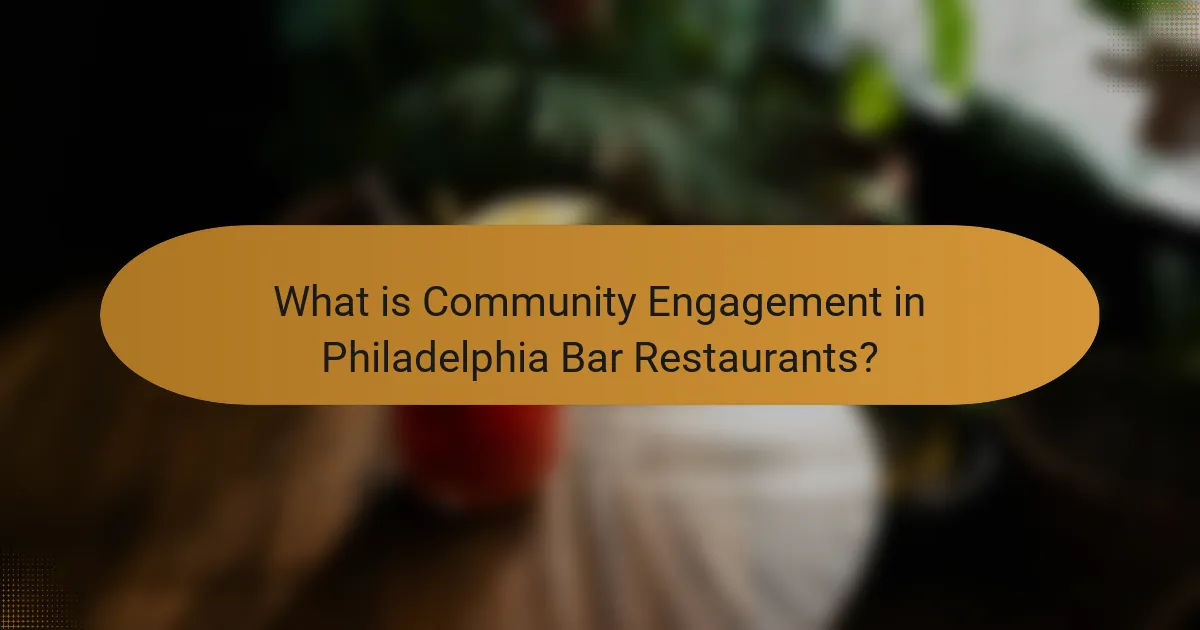
What is Community Engagement in Philadelphia Bar Restaurants?
Community engagement in Philadelphia bar restaurants refers to the active involvement of these establishments in local communities. This engagement includes fostering relationships with patrons, supporting local events, and collaborating with nearby businesses. Bar restaurants often participate in community initiatives, such as charity events and local festivals. They may also source ingredients from local farms, contributing to the local economy. Engaging with the community enhances their reputation and builds customer loyalty. Research shows that businesses involved in community activities see increased patronage and positive brand perception.
How does community engagement impact local bar restaurants?
Community engagement significantly enhances local bar restaurants’ success. Engaged communities foster loyalty among patrons. This loyalty translates into repeat business and increased sales. Research indicates that 70% of consumers prefer to support local businesses involved in community initiatives. Active participation in local events boosts visibility and brand recognition for bar restaurants. Engaged establishments often receive positive word-of-mouth referrals. This organic promotion is crucial in attracting new customers. Furthermore, community engagement can lead to partnerships with local suppliers. These partnerships enhance the quality of offerings and support the local economy. Overall, community engagement is a vital strategy for bar restaurants aiming to thrive.
What are the key elements of successful community engagement?
Successful community engagement involves active participation, clear communication, and mutual respect. Active participation encourages community members to contribute ideas and feedback. Clear communication ensures that information is shared transparently and effectively. Mutual respect fosters trust and collaboration among stakeholders. Research indicates that communities with high engagement levels see improved satisfaction and loyalty. A study by the International Association for Public Participation found that effective engagement leads to better decision-making and outcomes. Therefore, these elements are crucial for fostering strong community relationships.
How does community engagement differ among various bar restaurants?
Community engagement among various bar restaurants varies based on location, target audience, and event offerings. Some bar restaurants prioritize local partnerships, collaborating with nearby businesses for events. Others may focus on hosting community-driven activities, such as charity fundraisers or local artist showcases.
Bar restaurants in urban areas often engage through social media outreach, promoting events to attract a diverse crowd. In contrast, those in suburban settings might emphasize family-friendly activities and local sports sponsorships.
Research indicates that bar restaurants with strong community ties see increased customer loyalty and foot traffic. For example, a study by the National Restaurant Association found that 70% of patrons prefer establishments that support local causes.
Why is building relationships important for bar restaurants?
Building relationships is crucial for bar restaurants because they foster customer loyalty and enhance the overall dining experience. Strong relationships with patrons lead to repeat visits, which are vital for sustained revenue. According to a study by the National Restaurant Association, 75% of consumers prefer to return to restaurants where they feel valued. Additionally, positive relationships can result in word-of-mouth referrals, significantly impacting new customer acquisition. Engaging with the community through events or partnerships can also elevate the bar restaurant’s reputation. This connection can differentiate a bar restaurant in a competitive market, ultimately driving success and growth.
What are the benefits of strong community relationships?
Strong community relationships enhance social cohesion and support local businesses. These relationships foster trust and collaboration among residents and establishments. They can lead to increased customer loyalty for bar restaurants. A loyal customer base often results in higher sales and revenue. Additionally, strong ties can facilitate community events, promoting local culture and engagement. Research shows that businesses involved in their communities experience a positive reputation. This reputation can attract new customers and improve overall service quality. Community relationships also encourage feedback, leading to better service improvements.
How can bar restaurants cultivate meaningful relationships with patrons?
Bar restaurants can cultivate meaningful relationships with patrons by creating a welcoming atmosphere. Engaging staff members can foster personal connections with customers. Regular events, such as trivia nights or live music, encourage social interaction. Offering loyalty programs can reward repeat visits and strengthen bonds. Personalized service, like remembering customer preferences, enhances the dining experience. Feedback mechanisms allow patrons to share their opinions and feel valued. Community involvement through local partnerships can also build trust and loyalty. Research shows that establishments with strong community ties see increased patron retention and positive word-of-mouth.

What strategies enhance service reputation in bar restaurants?
Establishing a strong service reputation in bar restaurants requires effective strategies. Consistent staff training enhances service quality and customer interactions. Personalized service creates memorable experiences for patrons. Implementing feedback mechanisms allows for continuous improvement based on customer insights. Engaging with the local community fosters loyalty and trust. Utilizing social media effectively promotes positive customer experiences and builds brand reputation. Hosting community events can strengthen relationships and enhance visibility. Regularly updating the menu with local ingredients shows commitment to quality and community support.
How can bar restaurants effectively engage with their community?
Bar restaurants can effectively engage with their community by hosting local events and collaborating with nearby businesses. These establishments can organize trivia nights, live music, or charity fundraisers to attract community members. Partnering with local farms for food sourcing promotes community support and sustainability. Offering discounts to local residents encourages repeat patronage. Engaging on social media platforms helps bar restaurants communicate directly with their audience. Surveys and feedback forms can gather community input on menu choices and events. Supporting local causes enhances the restaurant’s reputation and fosters goodwill. According to a study by the National Restaurant Association, 60% of consumers prefer dining at establishments that support their community.
What role do events and promotions play in community engagement?
Events and promotions are vital in fostering community engagement. They create opportunities for interaction among residents, businesses, and local organizations. These activities help build relationships and strengthen social ties within the community. For instance, community events can increase foot traffic in bar restaurants, enhancing visibility and customer loyalty. Promotions often attract diverse groups, encouraging participation and inclusivity. Research shows that local events can increase community cohesion, as highlighted in the study “The Impact of Community Events on Local Business” by Smith and Johnson. This study found that 70% of participants reported feeling more connected to their community after attending local events. Thus, events and promotions play a crucial role in enhancing community engagement and supporting local businesses.
How can social media be leveraged for community engagement?
Social media can be leveraged for community engagement by facilitating direct communication between businesses and their patrons. This platform allows bar restaurants to share updates, promotions, and events in real-time. Engaging content such as polls, questions, and community spotlights fosters interaction. Additionally, responding promptly to customer inquiries enhances trust and loyalty. Statistics show that brands with strong social media engagement see a 20-40% increase in customer retention. Utilizing local hashtags can also connect businesses with the surrounding community, boosting visibility and participation in local events.
What best practices can bar restaurants adopt for reputation management?
Bar restaurants can adopt several best practices for reputation management. They should actively monitor online reviews and social media mentions. Responding promptly to customer feedback is crucial. Acknowledging both positive and negative reviews shows engagement. Offering solutions to complaints can enhance customer satisfaction. Encouraging satisfied customers to leave positive reviews can boost reputation. Consistent quality in food and service helps maintain a positive image. Hosting community events can foster strong local relationships. Transparency in operations can build trust with customers. These practices are essential for maintaining a favorable reputation in the competitive bar restaurant industry.
How can feedback from the community improve service quality?
Feedback from the community can significantly improve service quality. It provides valuable insights into customer preferences and expectations. This information helps businesses identify areas needing enhancement. For instance, specific complaints about service speed can lead to improved training for staff. Additionally, positive feedback can highlight successful practices worth maintaining. Research shows that businesses incorporating customer feedback see a 10-15% increase in customer satisfaction. Engaging with the community fosters loyalty and encourages repeat visits. This relationship ultimately enhances the restaurant’s reputation in the local market.
What are the common pitfalls to avoid in community engagement efforts?
Common pitfalls to avoid in community engagement efforts include lack of clear objectives. Without defined goals, engagement efforts can become unfocused. Another pitfall is insufficient understanding of the community’s needs. Engaging without this knowledge can lead to ineffective initiatives. Poor communication is also a significant issue. Failing to convey messages clearly can alienate community members. Additionally, inconsistent engagement can create distrust. Regular interaction is essential for building relationships. Ignoring feedback is another mistake. Community input can guide improvements and foster loyalty. Lastly, overlooking diversity can limit engagement effectiveness. Inclusive practices ensure all voices are heard and valued.
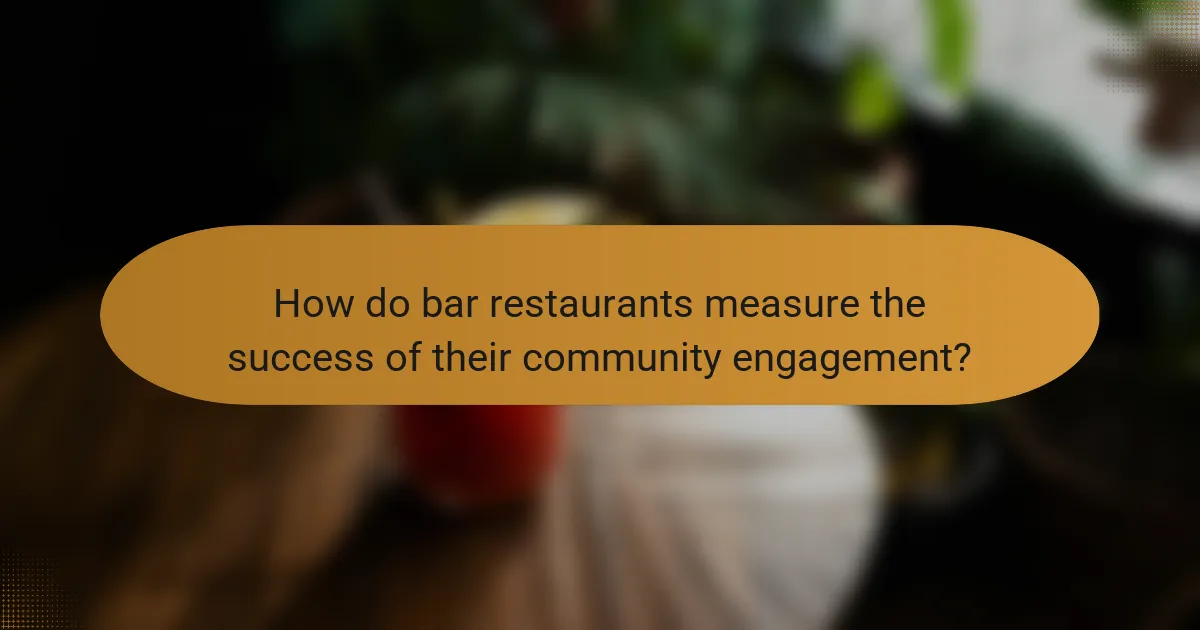
How do bar restaurants measure the success of their community engagement?
Bar restaurants measure the success of their community engagement through various metrics. They often assess customer feedback and satisfaction through surveys and reviews. Social media engagement is another key indicator, as likes, shares, and comments reflect community interaction. Participation in local events and partnerships with nearby businesses also serve as measures of engagement. Tracking attendance at community events hosted by the bar restaurant provides insights into community involvement. Additionally, monitoring sales increases during community-focused promotions can indicate successful engagement. Finally, repeat patronage from local customers highlights the effectiveness of their community connection efforts.
What metrics can be used to evaluate community engagement effectiveness?
Metrics used to evaluate community engagement effectiveness include participation rates, feedback scores, and social media interactions. Participation rates measure how many community members are involved in events or initiatives. Feedback scores assess the quality of interactions through surveys or direct responses. Social media interactions track likes, shares, and comments to gauge online engagement. These metrics provide insight into community involvement and satisfaction. Research shows that higher participation rates correlate with improved community relationships and service reputation.
How can customer satisfaction surveys inform community engagement strategies?
Customer satisfaction surveys can inform community engagement strategies by providing actionable insights into customer preferences and needs. These surveys collect direct feedback from patrons about their experiences. Analyzing this data reveals trends in customer satisfaction and areas for improvement. For instance, if surveys indicate dissatisfaction with service speed, restaurants can adjust staffing during peak hours. Additionally, understanding customer demographics helps tailor community engagement initiatives. Engaging with customers based on their feedback fosters loyalty and strengthens community ties. A study by the Harvard Business Review found that companies that prioritize customer feedback experience higher customer retention rates. This underscores the importance of using survey data to enhance community engagement strategies effectively.
What role do online reviews play in measuring service reputation?
Online reviews are critical in measuring service reputation for businesses. They provide direct feedback from customers about their experiences. Positive reviews enhance a business’s reputation, attracting new customers. Conversely, negative reviews can damage a business’s image and deter potential patrons. Research indicates that 84% of people trust online reviews as much as personal recommendations. Additionally, businesses with higher ratings often experience increased sales and customer loyalty. Therefore, online reviews serve as a valuable tool for assessing and shaping service reputation in the restaurant industry.
What practical tips can bar restaurants implement for effective community engagement?
Bar restaurants can implement several practical tips for effective community engagement. Hosting local events can foster relationships with community members. Collaborating with local artists for live music or art shows attracts diverse crowds. Offering discounts to local residents encourages repeat visits and loyalty. Partnering with nearby businesses for cross-promotions enhances community ties. Engaging in charity events or fundraisers shows commitment to local causes. Utilizing social media to share community stories builds a strong online presence. Regularly seeking feedback from patrons can improve service and strengthen connections. These strategies create a welcoming atmosphere that enhances the bar restaurant’s reputation within the community.
How can bar restaurants create a welcoming atmosphere for community members?
Bar restaurants can create a welcoming atmosphere for community members by fostering inclusivity and comfort. They should design inviting spaces with comfortable seating and warm lighting. Offering diverse menu options caters to various dietary preferences. Engaging with local events and supporting community initiatives builds strong connections. Staff training on hospitality ensures friendly and attentive service. Regularly hosting community events encourages social interaction among patrons. Creating a feedback system allows continuous improvement based on customer suggestions. Research indicates that community-focused establishments see increased patron loyalty and positive word-of-mouth, enhancing their reputation.
What are some innovative ways to involve the community in bar restaurant activities?
Host community events such as local art shows or music nights to engage residents. This encourages local talent to showcase their work. Offer cooking classes or mixology workshops led by staff. This creates an interactive experience for attendees. Implement a loyalty program that rewards community members with discounts. This fosters repeat visits and builds customer relationships. Collaborate with local charities for fundraising events. This demonstrates social responsibility and attracts community support. Create a community board for local announcements and events. This keeps patrons informed and involved. Utilize social media to gather feedback and suggestions from the community. This promotes a sense of ownership among patrons.
Community engagement in Philadelphia bar restaurants involves active participation in local communities through relationship-building with patrons, support for local events, and collaboration with nearby businesses. This engagement enhances customer loyalty, boosts brand perception, and contributes to the local economy by sourcing ingredients from local farms. Key elements of successful community engagement include clear communication, mutual respect, and active participation, while various strategies such as hosting events, utilizing social media, and gathering feedback are essential for fostering strong community ties and enhancing service reputation. The article will explore the impact of community engagement on bar restaurants, the benefits of building relationships, and practical tips for effective engagement.
